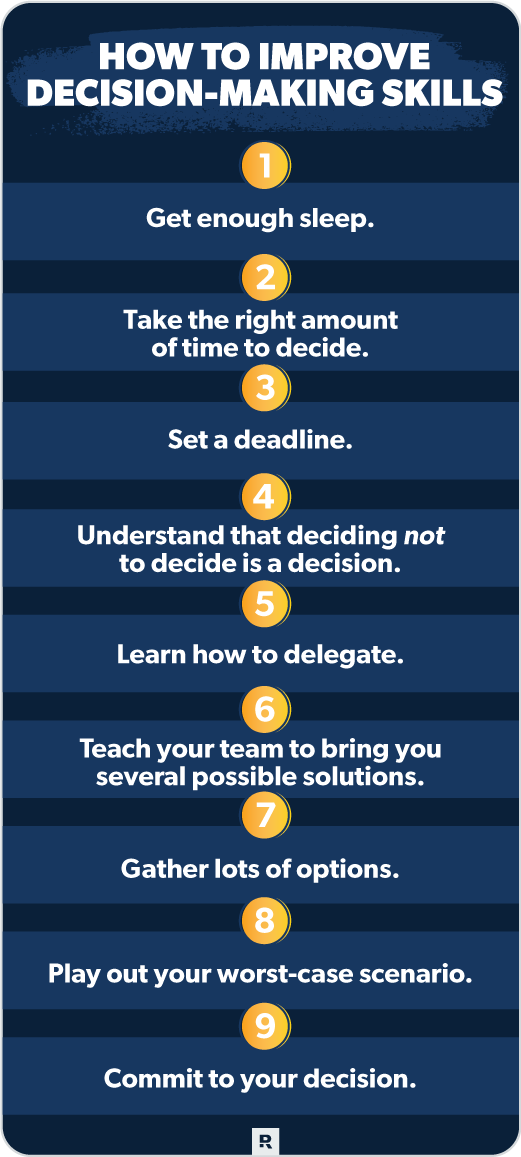The Amazing Craft of Making Choices: Developing Robust Decision-Making Abilities

In today's fast-paced world, executing effective decisions can sometimes feel challenging. Whether you're faced with significant career choices, personal dilemmas, or daily life situations, the ability to navigate these decisions with certainty and lucidity is vital. Strong decision-making skills merely influence our outcomes but also shape our experiences and growth. By grasping the art of choosing wisely, we can foster a more rewarding and prosperous life.
The following article examines a holistic approach to enhancing decision-making skills, offering proven techniques and insights into the cognitive aspects of our choices. From leveraging intuition and critical thinking to preventing decision fatigue , we will delve into various strategies that equip individuals to make improved choices even under pressure. Whether you are a leader looking to make difficult calls or someone seeking to improve your everyday decision-making, there is valuable knowledge to gain that can transform how you tackle every decision in your life.
Strategies for Efficient Decision-Choosing
Effective decision-choosing requires a blend of logical skills and social intelligence. A single of the most impactful techniques is the application of decision-making frameworks. These structured methods help people assess options in an organized manner, ensuring that all relevant factors are considered before reaching a conclusion. Instances include the advantages and disadvantages list, the SWOT analysis, and the decision grid. By employing these frameworks, you can achieve clarity and make informed choices with certainty.
Another key technique is to nurture mindfulness during the decision-choosing process. By being present and aware of your cognition and feelings, you can minimize anxiety and enhance mental clarity. Mindfulness allows you to pause, reflect, and assess your options without being burdened by stress or external pressure. This practice not just improves your decision-choosing skills but also fosters a greater understanding of your beliefs and priorities.
Lastly, it is important to learn from previous decisions, both good and bad. Contemplating on past choices can reveal patterns in your decision-making process, helping you to identify areas for enhancement. Promoting a growth mindset enables you to perceive failures as learning chances rather than mistakes. This approach fosters resilience and adaptability, essential traits for making more effective decisions in the future. spintax
Psychology and Emotional Awareness in Choices
Comprehending the psychology behind decision-making can significantly enhance our ability to make wise decisions. Our thoughts, feelings, and external influences all play a crucial role in shaping our choices. Mental biases, such as the tendency to favor information that confirms our beliefs and overconfidence, can distort our decision-making, leading to ineffective decisions. Recognizing these biases allows us to take a step back and evaluate our thinking more critically. By cultivating self-awareness, we can identify when our choices is clouded by emotional responses or biases, enabling a more rational approach toward important choices.
Emotional awareness is crucial in navigating difficult choices, especially under stress. It encompasses the ability to comprehend and manage our emotions and understand with others. This skill helps us evaluate situations from various angles, leading to more thoughtful and informed outcomes. When confronted with complex dilemmas, leveraging emotional intelligence allows us to remain calm and focused, fostering better focus and understanding. By identifying our triggers and those of others involved, we can make more balanced choices that take into account the human element of every situation.
Making decisions is not solely a rational process; feelings are intertwined with our decisions. Understanding how to embrace and harness our emotions, instead of ignoring them, can be a crucial asset. For instance, positive emotions can inspire creative ideas, while bad feelings may signal the need for care. By developing the ability to cope with emotions, we can learn to handle high-pressure scenarios more effectively and make informed decisions that align with our principles. In doing so, we cultivate a method of making decisions that is both logical and emotionally attuned, resulting in decisions that are more satisfying and in harmony with our genuine goals.
Approaches for Overcoming Decision Overload

An effective method to alleviate decision fatigue is to simplify your choices. This can be achieved by defining concise priorities and narrowing the number of options before reaching a decision. For example's sake, establish a series of standards that matters to you, enabling you to filter options quickly and efficiently. By reducing the number of choices you face, you can save mental energy and reduce cognitive load.
An additional useful method is to formulate routines and make certain decisions automatic. By creating habits around regular choices, such as meals or your morning routine, you liberate cognitive resources for more significant decisions. This approach not only decreases the number of decisions you need to make but also builds a sense of stability and dependability in your day-to-day life, allowing you to approach more challenging decisions with a clearer mind.
Finally, incorporating breaks and awareness into your routine can profoundly help in reducing decision fatigue. Taking short breaks throughout your day to rejuvenate your mind can refresh your cognitive functioning and enhance clarity. Additionally, mindfulness practices can enhance your perception of stress and mental clutter, assisting you make decisions with greater focus and intention. By emphasizing self-care and mental clarity, you can enhance your overall decision-making skills .
